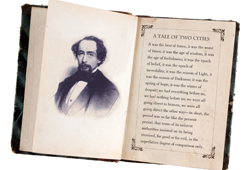|
Dickens' father was imprisoned in 1824 because of financial problems. To pay for his debt and help his family, Dickens, then 12 years old, was forced to leave school and work 10-hour days as a child labor. At a very young age, he had tasted the bitterness and pains of the bottom life in London. Thus he expressed his sympathy for the poor who were treated unfairly in his works.
"The most significant thing about Dickens is that he not only faced the reality and depicted the pains of the people with extraordinary insights, but also called on the government and the public to take measures to improve the well-being of the common people," said Tie Ning, a famous Chinese writer and Chairwoman of Chinese Writers' Association.
Fang Fang, a Chinese contemporary writer and the winner of the Fifth Lu Xun Literature Award in 2010, said on her micro-blog, "Dickens' works tell me that the civilization of a society depends on its attitude toward the weak. And the writers' attitude is an important reference to measure the extent of social civilization."
The rampant worship of money that has engulfed Chinese society in recent years has caused, as expected, an admiration for the rich and neglect of the poor.
"When we again read Dickens' works today, we always find warnings that the virtue and kindness can lead people happy while greed can drive people to go the wrong way," said Fang.
Another important spiritual legacy of Dickens is critical realism.
Dickens' depictions of urbanization and industrialization in the 19th century created a view of his age. He observed and captured the humanity under the background of London's expansion by using critical realism. Even today, Dickens' insights on social injustices remain relevant.
Lu Jiande, Director of the Institute of Literary Studies of the Chinese Academy of Social Sciences, praised Dickens.

"By starting A Tale of Two Cities with such wise and widely quoted sentences: It was the best of times, it was the worst of times, Dickens wanted to warn people of the hidden darkness when everybody was complacent in good times," said Lu.
In Dickens' age, Britain was in the midst of an unparalleled industrial revolution. Factories sprang up bellowing plumes of soot and pollution into the air in the name of progress. These factories became a refuge for the poor peasants who had nowhere else to live after losing their land or homes. Dickens threw himself into his works criticizing the hideous side of humanity in his age to stir the conscience of the people.
Today, China is also enjoying similar good times—but behind the scene of a booming economy hides huge potential crisis. Despite the fact that China is the second largest economy in the world, a large number of its people still lead impoverished lives in the central and western parts of the country. Migrant workers from the countryside have a hard time in cities since many are denied basic social securities services.
"In such a rapidly-changing society, the complex humanity can be displayed intensively, which provides writers with opportunities to create works," said Mo Yan, a Chinese writer and the winner of the Sixth Mao Dun Literature Award in 2005.
"Just writing stories is not a writer's job. These people are tasked with figuring out root problems and presenting them to the society."
"Dickens was deeply concerned about the weak in cities when depicting cities and petty bourgeois," said Zhang Jianfei, literature professor of Wuhan University in central China's Hubei Province. "Aside from painting dismal portraits of society, he also pointed out the good in man."
Email us at: baishi@bjreview.com | 